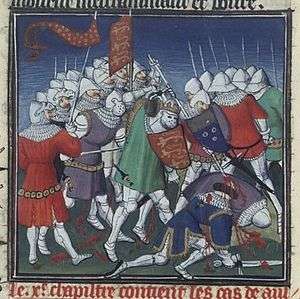Battle of Tinchebray
Coordinates: 48°45′54.9″N 0°43′40.2″W / 48.765250°N 0.727833°W
| Battle of Tinchebray | |||||||
|---|---|---|---|---|---|---|---|
| Part of Henry I of England's invasion of Normandy | |||||||
 Late medieval picture from the 15th century of the Battle of Tinchebray | |||||||
| |||||||
| Belligerents | |||||||
| Robert Curthose, the Duke of Normandy | Henry I of England | ||||||
| Commanders and leaders | |||||||
|
William, Count of Mortain Robert of Bellême, 3rd Earl of Shrewsbury |
Ranulf of Bayeux Robert de Beaumont, Count of Meulan William de Warenne Elias I of Maine Alan IV, Duke of Brittany William, Count of Évreux Ralph of Tosny Robert of Montfort Robert of Grandmesnil | ||||||
| Strength | |||||||
| Unknown | Unknown | ||||||
| Casualties and losses | |||||||
| Unknown | Unknown | ||||||
The Battle of Tinchebray (alternate spellings Tinchebrai or Tenchebrai) was fought 28 September 1106, in the town of Tinchebray (in today's Orne département of France), Normandy, between an invading force led by King Henry I of England, and his older brother Robert Curthose, the Duke of Normandy.[1] Henry's knights won a decisive victory, capturing Robert and imprisoning him in England (in Devizes Castle) and then Wales until Robert's death (in Cardiff Castle).[2]
The previous year Henry had invaded Normandy, taking Bayeux and Caen. He was forced to break off his campaign owing to political problems arising from the Investiture Controversy.[3] With these settled, he returned to Normandy in the spring of 1106.[3] After quickly taking the fortified abbey of Saint-Pierre sur Dives (near Falaise), Henry turned south and besieged the castle of Tinchebray, on a hill above the town.[1] Tinchebray is on the border of the county of Mortain, in the southwest of Normandy, and was held by William, Count of Mortain, who was one of the few important Norman barons still loyal to Robert.[4] Duke Robert then brought up his forces to break the siege, and, after some unsuccessful negotiations, decided that a battle in the open was his best option.[4]
Henry's army was organized into three groups.[5] The main two were commanded by Ranulf of Bayeux, Robert de Beaumont, 1st Earl of Leicester, and William de Warenne, 2nd Earl of Surrey.[5] In addition he had a reserve, commanded by Elias I of Maine, out of sight on the flank.[5] Also on Henry's side were Alan IV, Duke of Brittany, William, Count of Évreux, Ralph of Tosny, Robert of Montfort, and Robert of Grandmesil. On Robert Curthose's side were William, Count of Mortain, and Robert of Bellême, 3rd Earl of Shrewsbury.[6]
The battle itself only lasted an hour.[7] Notably, Henry ordered much of his force of knights to dismount, as he did himself: unusual for Norman battle tactics, infantry played a decisive role.[8] The Count of Évreux charged the front line, comprising troops of Bayeux, Avranches and the Cotentin.[9] The intervention of Henry's reserve proved decisive. Most of Robert's army was captured or killed. Besides Robert himself, those captured include Edgar Atheling (uncle of Henry's wife), and William, count of Mortain.[10] Robert de Bellême, commanding the Duke's rear guard, turned his back on the duke and led the retreat saving himself from capture or death.[11] Most of the prisoners were released, but Robert Curthose and William of Mortain were to spend the rest of their lives in captivity.[12] But Robert Curthose had a legitimate son, William Clito, whose claims to the dukedom of Normandy led to several rebellions that continued through the rest of Henry's reign.[13]
References
- 1 2 C. Warren Hollister, Henry I, ed. Amanda Clark Frost (New Haven; London, Yale University Press, 2003), p. 199
- ↑ David Crouch, The Normans; The History of a Dynasty (London. New York: Hambledon Continuum, 2007), pp. 178-79
- 1 2 David Crouch, The Normans; The History of a Dynasty (London. New York: Hambledon Continuum, 2007), pp. 176-77
- 1 2 Charles Wendell David, Robert Curthose (Cambridge: Harvard University Press, 1920), p. 172
- 1 2 3 H. W. C. Davis, 'A Contemporary Account of the Battle of Tinchebrai', The English Historical Review, Vol. 24, No. 96 (Oct., 1909), p. 731
- ↑ Charles Wendell David, Robert Curthose (Cambridge: Harvard University Press, 1920), p. 174
- ↑ H. W. C. Davis, 'A Contemporary Account of the Battle of Tinchebrai', The English Historical Review, Vol. 24, No. 96 (Oct., 1909), p. 729
- ↑ H. W. C. Davis, 'A Contemporary Account of the Battle of Tinchebrai', The English Historical Review, Vol. 24, No. 96 (Oct., 1909), pp. 731-32
- ↑ Matthew Strickland, Anglo-Norman Warfare: Studies in Late Anglo-Saxon and Anglo-Norman Military Organization and Warfare (Woodbridge: Boydell Press, 1993), p. 187
- ↑ Charles Wendell David, Robert Curthose (Cambridge: Harvard University Press, 1920), p. 175
- ↑ Kathleen Thompson, 'Orderic Vitalis and Robert of Bellême', Journal of Medieval History, Vol. 20 (1994), p. 137
- ↑ Charles Wendell David, Robert Curthose (Cambridge: Harvard University Press, 1920), p. 179
- ↑ François Neveux, The Normans; The Conquests the Changed the Face of Europe, trans. Howard Curtis (London: Constable & Robinson Ltd., 2008), p. 177
In fiction
The battle is depicted in Rosemary Sutcliff's 1960 historical fiction novel Knight's Fee.